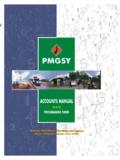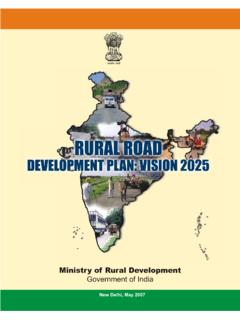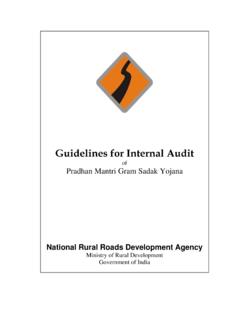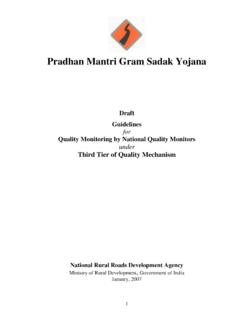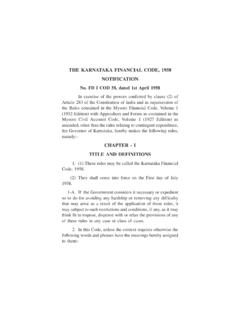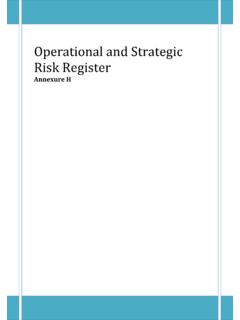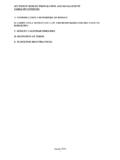Transcription of OFFICE PROCEDURE MANUAL - PMGSY Home Page
1 NATIONAL RURAL ROADS DEVELOPMENT AGENCY MINISTRY OF RURAL DEVELOPMENT GOVERNMENT OF INDIA OFFICE PROCEDURE MANUAL DECEMBER, 2004 - 2 - CONTENTS Definitions 3 General Guidelines 5 OFFICE PROCEDURE : 7 - Receipt & Diarising of Papers 7 - Filing of Papers 8 - Action on Receipts 11 - Guidelines for Recording Notes 13 - Forms of Communication 17 - Records Management 18 Stores 22 Reports & Returns 28 Housekeeping 31 Annual Confidential Reports 33 APPENDICES PAGE 1.
2 Central Diary Register 38 2. Division Diary 38 3. Functional Filing System 39 4. File Register 45 5. File Movement Register 45 6. Standard Process Sheet and Skeleton Note 46 7. Drafting of Communications 47 8. Dispatch Register For Postal Communications 48 9. Messenger Book 48 10. Specimen Formats For Communications 49 11. Illustrative List of Records for Permanent Preservation 52 12. Records Review Register 53 13. Retention Schedule for Records pertaining to internal administration and management of the OFFICE of NRRDA 53 14. Retention Schedule for Records pertaining to the Personal, Establishment & Housekeeping matters. 54 15. Purchasing Through Tenders (Guidelines) 58 16. Standards of Financial Propriety 63 17. Stock Register 64 18. Annual Maintenance Contracts Proforma 64 19.
3 Register for Annual Maintenance Contracts 66 20. Register for Stock Verification 66 21. Register for Stores Declared Surplus, Obsolete & Unserviceable 66 22. Stock Register for Stationery 66 - 3 -23. Formats for Recording Annual Confidential Reports 67 - 4 - DEFINITIONS Agency: The National Rural Roads Development Agency (NRRDA). Case: A current file or a receipt together with other related papers, if any. Competent Authority: Director General, NRRDA, or such other authority to whom powers to be exercised under any of the Rules are delegated by the Director General. Contingent Expenditure: All incidental and other expenditure including expenditure on stores which is incurred for the management of an OFFICE . It does not include any expenditure, which has been specifically classified as falling under some other Head of expenditure.
4 Controlling Officer: An officer entrusted with the responsibility of controlling incurring of the expenditure and/or declared as such in respect of each category of employees of the Agency. Correspondence portion: The portion containing Receipts and OFFICE copies of Issue in a file. Current file: A file action on which has not been completed. Dak: Every type of written communication such as letter, telegram, interdepartmental note, file, which is received, whether by post or otherwise, in any department of NRRDA for its consideration. Dealing Officer: An officer or any other functionary of the Agency entrusted with initial examination and noting upon cases. Diarist: A clerk charged with the responsibility, inter alia, of maintaining the Division Diary. Diarising: Registration of receipts in the Central Diary as well as in the diary registers maintained in each Division.
5 Diary number: The serial number assigned to a receipt in the Central / Division Diary. Disbursing Officer: A Head of OFFICE and also any other officer designated as such by the Head of Department to draw bills and make payments on behalf of the Agency. Docketing: Making entries in the Notes portion of a file about the serial number assigned to each item of correspondence, whether Receipt or Issue, for its identification. Employee: Any person who is serving in the Agency as a regularly appointed employee on deputation from the Government of India or a State Government / Administration or from any other autonomous or semi-Government organization. Persons provided under any contract for outsourcing are specifically excluded from the purview of this definition. File: A collection of papers on a specific subject, assigned a file number and consisting of the following parts, viz.
6 , Correspondence, Notes, Appendix to correspondence and Appendix to notes. Final disposal: Completion of all action in a case culminating, where necessary, in the issue of final orders or a final reply to the party from which the original communication had emanated. Fresh Receipt (FR): Any subsequent receipt on a case, which brings in additional information to aid the disposal of a paper under consideration. - 5 - Financial Year: The year beginning on the 1st of April and ending on 31st of March following. Government: The Government of India. Head of the Department: In relation to the Agency, the Director General, NRRDA. Head of OFFICE : Director (F&A) of the Agency and any other officer or person nominated to act as such by the Head of the Department. Issue: A communication issued in a case. Limited Tender: Invitation to tender extended to a limited number of firms which are borne on the list of approved contractors or suppliers.
7 Messenger Book: A record maintained in the form of particulars of dispatch of non-postal communications and their receipt by the addressees. Misc. Expenditure: All expenditure not classifiable in the list of object heads of account. Note: The remarks recorded on a case to facilitate its disposal. It includes a summary of previous papers, a statement or an analysis of the questions requiring decision, suggestions, regarding the course of action and final orders passed thereon. Notes portion: The portion of a file containing Notes or Minutes recorded on a case. Open Tender: An invitation to tender by public advertisement. Parliamentary matters: Parliament Question, Assurances and such other matters. Paper Under Consideration (PUC): A receipt on a file, the consideration of which forms its subject matter. Pay: Basic Pay plus Dearness Pay being drawn by an employee.
8 Receipt: Dak after it has been received by the concerned Division /officer. Recording: The process of closing a file after action on all the issues considered on it has been completed. It includes operations like completing references, removing routine papers, revising title of the file, changing the file cover, recording the important rulings and decisions, if any, in the Standing Guard File, classifying and stitching the file. Recurring expenditure: The expenditure on an item which is incurred at periodic intervals, due to the continuing nature of the activity. Reference Folder: A folder containing copies of relevant rules, orders, instruction etc. arranged in a chronological order. Single Tender: An invitation to tender sent to a single party. Stores: o All items and materials (including software) purchased or otherwise acquired by the Agency for its use.
9 ( Durable Stores ). o All expendable and consumable items or materials. ( Consumable Stores ). o Articles of Deadstock in the nature of plant, machinery, furniture, fixtures etc. o This term shall not, however, cover any books, publications, periodicals etc. Storekeeper: The official entrusted with the management of Stores. (Management shall include indenting, purchase, custody, issue of stores and all other related functions.) Urgent Dak: Dak marked Immediate or Priority . It also includes telegrams, wireless messages, telex messages, fax etc. - 6 - GENERAL GUIDELINES Working Hours 9 Working hours of the OFFICE will be from 9-00 to 5-30 with half an hour lunch break from 1-00 to 1-30 or 1-30 to 2-00 as designated for different categories 9 The prescribed working hours, including the lunch break, should be strictly adhered to by every body.
10 The officers and the staff must not overstay the lunch break. 9 Every employee shall record his/her attendance in OFFICE by putting initials along with the time of arrival/departure in ink. 8 Irregularity in attending OFFICE is highly objectionable. It amounts to lack of devotion to duty and shall be viewed with disfavor. 8 Late attendance of an employee may be condoned if caused by reasons beyond his control but not more than twice a month. Half-a-day s casual leave will be debited to the casual leave account of the employee for each occasion of late attendance. 8 Habitual late-coming will invite disciplinary action. Use of Telephone and Computers 9 Telephones should be used whenever necessary to speed up communication and decision making. STD/Trunk facilities may, however, be used keeping in view the importance / urgency. 8 Use of private e-mail is discouraged and use of Internet chatting is prohibited.
